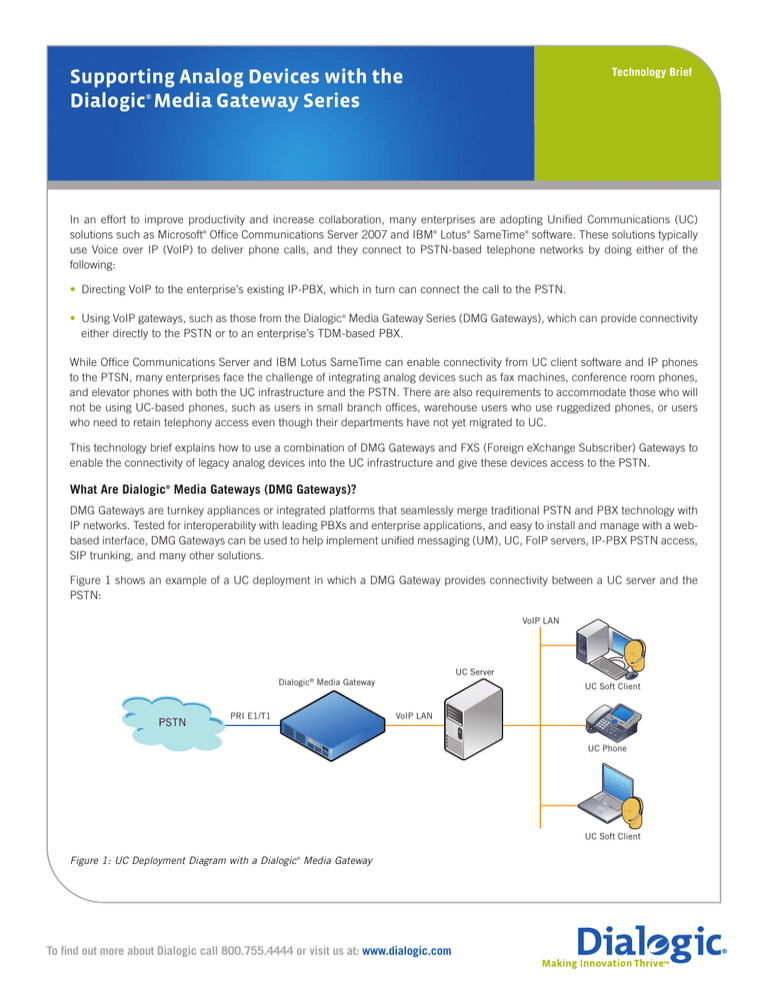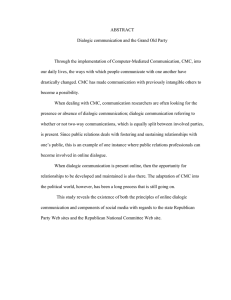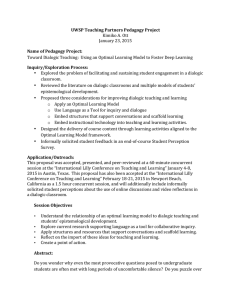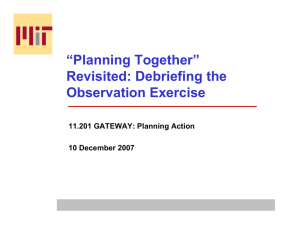
Technology Brief
Supporting Analog Devices with the
Dialogic Media Gateway Series
®
In an effort to improve productivity and increase collaboration, many enterprises are adopting Unified Communications (UC)
solutions such as Microsoft Office Communications Server 2007 and IBM Lotus SameTime software. These solutions typically
use Voice over IP (VoIP) to deliver phone calls, and they connect to PSTN-based telephone networks by doing either of the
following:
®
®
®
®
• Directing VoIP to the enterprise’s existing IP-PBX, which in turn can connect the call to the PSTN.
• Using VoIP gateways, such as those from the Dialogic Media Gateway Series (DMG Gateways), which can provide connectivity
either directly to the PSTN or to an enterprise’s TDM-based PBX.
®
While Office Communications Server and IBM Lotus SameTime can enable connectivity from UC client software and IP phones
to the PTSN, many enterprises face the challenge of integrating analog devices such as fax machines, conference room phones,
and elevator phones with both the UC infrastructure and the PSTN. There are also requirements to accommodate those who will
not be using UC-based phones, such as users in small branch offices, warehouse users who use ruggedized phones, or users
who need to retain telephony access even though their departments have not yet migrated to UC.
Large Logo
This technology brief explains how to use a combination of DMG Gateways and FXS (Foreign eXchange
Subscriber) Gateways to
enable the connectivity of legacy analog devices into the UC infrastructure and give these devices access to the PSTN.
What Are Dialogic Media Gateways (DMG Gateways)?
®
DMG Gateways are turnkey appliances or integrated platforms that seamlessly merge traditional PSTN and PBX technology with
IP networks. Tested for interoperability with leading PBXs and enterprise applications, and easy to install and manage with a webbased interface, DMG Gateways can be used to help implement unified messaging (UM), UC, FoIP servers, IP-PBX PSTN access,
SIP trunking, and many other solutions.
Figure 1 shows an example of a UC deployment in which a DMG Gateway provides connectivity between a UC server and the
PSTN:
VoIP LAN
UC Server
Dialogic® Media Gateway
PSTN
PRI E1/T1
UC Soft Client
VoIP LAN
Medium Logo
UC Phone
UC Soft Client
Figure 1: UC Deployment Diagram with a Dialogic Media Gateway
®
To find out more about Dialogic call 800.755.4444 or visit us at: www.dialogic.com
Technology Brief
Supporting Analog Devices with the
Dialogic Media Gateway Series
®
In this example, the enterprise opted for a complete VoIP-based solution, removed the legacy PBX, and installed a UC solution
based on a UC Server and DMG Gateway. The DMG Gateway provides PTSN connectivity for the UC soft clients and phones, and
thus enables UC users to make voice calls to the PSTN, use mixed PSTN and VoIP conferencing resources, and use PSTN and
VoIP voice mail services.
This solution, however, does not support the connection of analog devices to the VoIP network. An FXS Gateway is a convenient
way to make this connection.
What is an FXS Gateway?
Analog devices such as telephones and fax machines are typically connected to either an analog line port provided by a telephone
company or a port on the PBX. These analog ports are known as FXS ports, and they provide the ring current and dial tones that
the analog devices require to operate. An FXS gateway, also referred to as an Analog Telephone Adapter (ATA), is a gateway with
FXS ports that can interconnect analog phone and fax calls to a VoIP network.
Enabling the Solution
Together, a DMG Gateway and FXS gateway can provide a solution for supporting analog devices in a UC environment. Figure 2
shows an example of this solution:
Fax
machine
VoIP LAN
1-Port FXS
Gateway
UC Server
Dialogic® Media Gateway
PSTN
PRI E1/T1
UC Soft Client
VoIP LAN
UC Phone
24-Port FXS
Gateway
1-Port FXS
Gateway
Analog Phones
4-Port FXS
Gateway
Warehouse
Conference Room
Phone
UC Soft Client
Analog Phones
Figure 2: Deployment Diagram with a Dialogic Media Gateway and Multiple FXS Gateways
®
In this example, several different capacity FXS gateways support different device groupings. The 24-port FXS Gateway supports
up to 24 analog phones in the enterprise’s primary location. The analog phones are connected to the DMG Gateway using VoIP,
and the routing rules and protocol support in the DMG Gateway provide the number translation and connection to the PSTN and
UC clients, enabling seamless connectivity between analog phone users and UC users.
2
Supporting Analog Devices with the
Dialogic Media Gateway Series
Technology Brief
®
A 1-port FXS gateway supports a fax machine and enables a Fax over IP (FoIP) connection to the DMG Gateway. Another 1-port
FXS gateway supports a conference room phone.
The warehouse has a requirement for ruggedized phones that are not yet available from UC vendors, so these phones are
connected to a 4-port FXS gateway and then to the DMG Gateway to enable PSTN and UC access for the warehouse.
For more information
Dialogic Enterprise Media Gateways
®
Dialogic 4000 Media Gateway Series Integration Note
®
Dialogic Media Gateway Installation and Configuration Integration Note
®
3
Small Logo
www.dialogic.com
Dialogic Corporation
9800 Cavendish Blvd., 5th floor
Montreal, Quebec
CANADA H4M 2V9
Dialogic is a registered trademark of Dialogic Corporation (“Dialogic”). Dialogic’s trademarks may be used publicly only with permission from Dialogic. Such permission
may only be granted by Dialogic’s legal department at the address provided above.
Microsoft is a registered trademark of Microsoft Corporation in the United States and/or other countries. IBM, Lotus, and Sametime are trademarks of International
Business Machines Corporation in the United States, other countries, or both. Other names of actual companies and product mentioned herein are the trademarks of their
respective owners.
Dialogic encourages all users of its products to procure all necessary intellectual property licenses required to implement their concepts or applications, which licenses
may vary from country to country. None of the information provided herein forms part of the specifications of the product(s) and any benefits specified are not guaranteed.
No licenses or warranties of any kind are provided hereunder.
Any use case(s) shown and/or described herein represent one or more examples of the various ways, scenarios or environments in which Dialogic® products can be used.
Such use case(s) are non-limiting and do not represent recommendations of Dialogic as to whether or how to use Dialogic products.
Dialogic may make changes to specification, product descriptions, and plans at any time, without notice.
Copyright © 2009 Dialogic Corporation
All rights reserved. 11/09
11659-01



